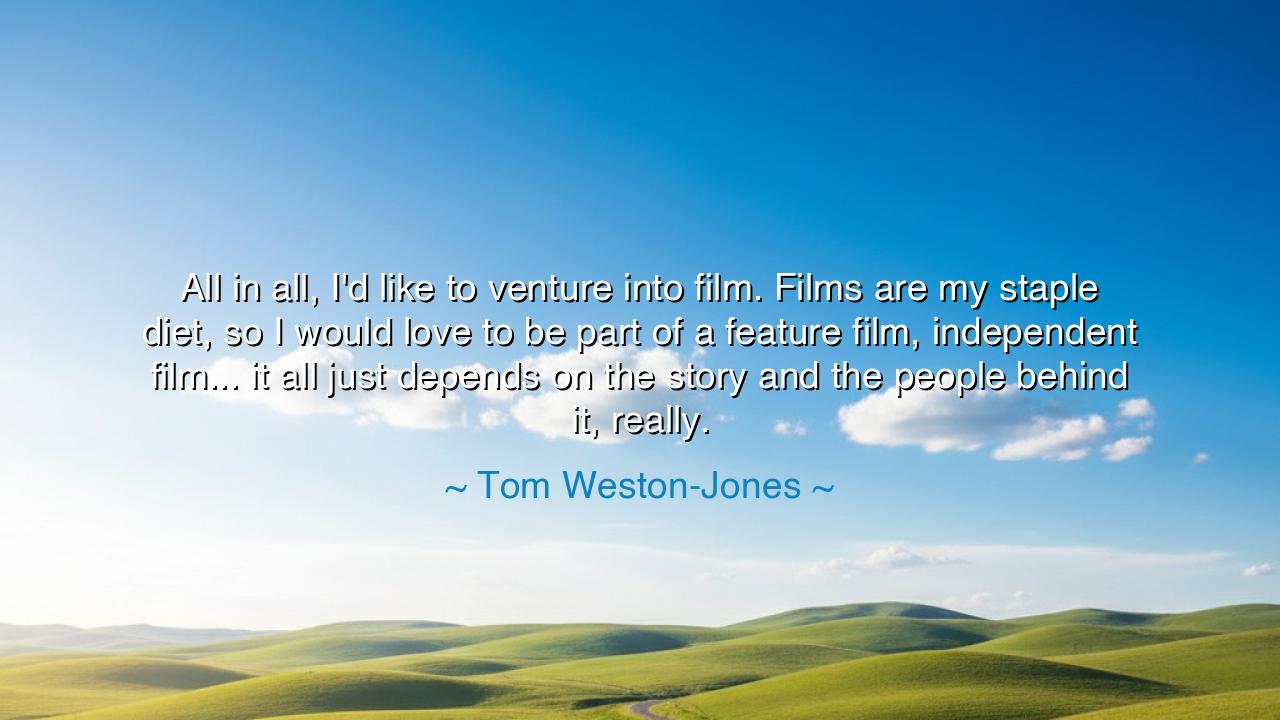
All in all, I'd like to venture into film. Films are my staple
All in all, I'd like to venture into film. Films are my staple diet, so I would love to be part of a feature film, independent film... it all just depends on the story and the people behind it, really.






In the words of Tom Weston-Jones, there is both humility and yearning: “All in all, I'd like to venture into film. Films are my staple diet, so I would love to be part of a feature film, independent film... it all just depends on the story and the people behind it, really.” To those who listen closely, this is not the voice of ambition alone, but of reverence—the reverence of an artist who understands that creation is not measured by fame, but by connection. Weston-Jones speaks as one who seeks not the glitter of the screen, but the soul of it. His words echo an ancient truth: that the calling of the artist is not to dominate the world, but to serve the story, to give life to truth through collaboration, passion, and purpose.
When he speaks of film as his “staple diet,” he does not mean mere entertainment. He speaks of nourishment, of something that sustains his spirit as bread sustains the body. To him, cinema is not a luxury—it is the food of imagination, the substance through which humanity feeds its yearning for meaning. Like the poets of old who gathered by the fire to tell stories of heroes and gods, the modern artist sits before the flickering light of film and finds the same thing—hope, reflection, and the communion of shared experience. Through his words, Weston-Jones reminds us that art, when it is true, is sustenance for the soul.
Yet he adds, with wisdom, that it all depends on the story and the people. Here lies the heart of his philosophy—the understanding that greatness is not born of grandeur, but of authenticity. The story is the heartbeat of creation; without it, all beauty is hollow. The people—those who labor, dream, and believe together—are the spirit that animates the work. This truth has echoed through every age. For what was the Theatre of Dionysus in ancient Greece but a place where story and people met to reveal the divine within the human? What were the bards of the Celts but keepers of memory, weaving tales not for gold, but for belonging? So too does Weston-Jones understand that to act is to serve something greater than oneself.
Consider the tale of Akira Kurosawa, the legendary Japanese filmmaker. He, too, began with reverence for story above all else. When asked what makes a great film, Kurosawa did not speak of technology, stars, or spectacle. He said, “If it’s not the story, it’s nothing.” For him, the soul of cinema was truth—the kind that could move nations and humble kings. Kurosawa, like Weston-Jones, knew that the artist’s duty is not to shine alone, but to illuminate. His films, forged in collaboration with writers, actors, and craftsmen, became immortal not because they were perfect, but because they were human.
There is also quiet courage in Weston-Jones’s desire to “venture” into film. The word itself—venture—implies risk, exploration, and faith. To venture is to leave behind comfort for the unknown, to walk into the wilderness of creativity with only vision as one’s compass. The ancients would call such a path heroic, for it mirrors the journey of every seeker who dares to pursue his calling. Whether actor, poet, or dreamer, one must step beyond the familiar to discover what the soul was born to express. And so, his longing is not mere ambition—it is the hunger for growth, for transformation through art.
But there is humility, too, in his acknowledgment that art depends on others—on the people behind it. In an age that worships individual fame, his words restore the sacred truth that art is communal. No film, no story, no vision stands alone. Behind every moment of brilliance lies the unseen labor of many hands, many hearts. Just as the sculptor owes his marble to the mountain and his tools to the blacksmith, so too does the actor owe his light to the director, the writer, and the crew. In this understanding, Weston-Jones aligns himself with the timeless brotherhood of creators—those who know that true greatness is shared.
Let us then draw from his words a lesson fit for all who dream. Pursue your craft not for recognition, but for reverence. Feed yourself on what inspires you, as Weston-Jones feeds on film, until it becomes your daily bread. Seek always the story that stirs your heart and the people who lift your spirit. Do not chase fame, for it fades like morning mist; instead, chase meaning, for it endures beyond time. And when you find the work that makes your soul burn with purpose—whether on stage, in film, or in life itself—give yourself to it wholly, as an offering.
For the wisdom hidden in these words is this: art is not about creation alone, but communion. The story and the people are one, and to serve them is to serve something eternal. In this, Weston-Jones speaks not only as an actor, but as a philosopher of purpose. His longing to “venture into film” becomes, for us all, a call to venture into our own truth—to live with passion, to create with integrity, and to surround ourselves with those whose hearts beat to the same rhythm of wonder. For when story and soul align, the ordinary becomes divine, and the artist becomes the vessel through which humanity remembers itself.






AAdministratorAdministrator
Welcome, honored guests. Please leave a comment, we will respond soon